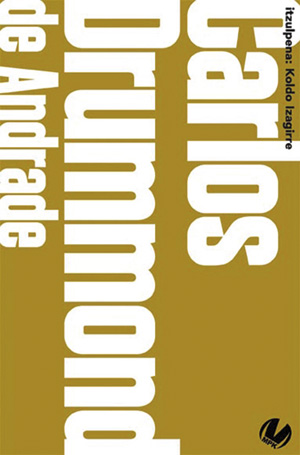
- AUTHOR:: Carlos Drummond de Andrade Susa, 2014 Translation:: Koldo Izagirre

“No meio do caminho tinha uma pedra / tinha uma pedra no meio do caminho / tinha uma pedra / no meio do caminho tinha uma pedra. // Never schemecerak me come to pass / in the life of tired tão latinas minhas. / Never scheming me that I did not walk / tinha uma pedra / tinha uma pedra no meio camindo ho / no meio do caminho tinha uma pedra”. Carlos Drummond de Andrade (Itabira, 1902 - Rio de Janeiro, 1987) inaugurated it, unknowingly, when he wrote in the middle of the Ruta, in the poetry of Brazil. It was 1928, and most people found it a poem without charge. But local modernism was losing its bellows and something else was coming. Interestingly, the poet turned to the source of Brazilian modernism. In the face of rupture and search, Carlos Drummond de Andrade proclaimed that the poet would always be marginal. He said with a kind humility, as Beñat Sarasola remembers in his foreword, that he was nothing but a smile, “on the face of a quiet man.”
Thanks to the translation given to us by Koldo Izagirre, we can approach the poetic work of the author who has brought a string as long as criticism and research. At the heart of the Route, he also had to make a biography of the famous stone of it, Uma pedra no meio do caminho. Biography of um poem, to respond to ingenious studies and bitter polemics that had no concrete moral, psychological or philosophical purpose, only wanted “the feeling of monotony and chaining, starting with words”.
This is also the reading of this poetic anthology. No mystery. Paradoxically, the interpretation is necessarily broad: “My heart does not play the art of knowing/playing. It hits away from the crazy ball/stadiums.”
The poetry of Carlos Drummond de Andrade is the highest, not the highest in the sky. It comes from complicated reflections on aesthetics, but the result is nothing more than a way of telling the truth close and elegant. “I haven’t written to you for a long time. / All news has become obsolete.” Melancholy and the desire for the future are united in a mystical and simple writing, without leaving room for criticism and bitterness. Who can understand all these apparent contradictions? Hearts in reading.